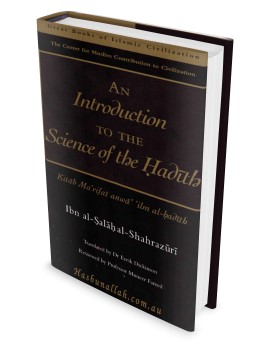Also known as “Ma’rifat Anwa ‘Ilm al-hadeeth”
Author: Ibn al-Salah al-Shahrazuri
Translated by: Dr. Eerik Dickinson
Ulum al-hadith (or ilm ul hadeeth or usul al-hadeeth or science of hadeeth) is the broad designation which includes all of the various disciplines making up the study of hadeeth. Among the works in this field are certain guidebooks which attempt to summarize the entire range of this material to allow students to understand the terminology of the collectors of hadeeth and to validate the methods of these collectors.
Ibn Hajar al-Asqalani presents a brief survey of the history of this sub-genre in the introduction of his book ‘Nuzhat al-Nazar’ (his commentary on his own Nukhbat al-Fikar) as:
The ancient and modern experts had many works about the terminology of the hadith scholars. Among the first to compose a work on this subject was the judge Abu Muhammad al-Ramahurmuzi. His book was al-Muhaddith al-fasil. However, he was not thorough. Abu Abd Allah al-Hakim al-Nisaburi was another one of the first but he did not revise and properly arrange the material. Abu Nuaym al-Isbahani followed him. He did make a supplement (mustakhraj) to the book of al-Hakim al-Nisaburi, but he left some things for his successors. Abu Bakr al-Khatib Baghdadi came after them. He composed a book he called al-Kifaya on the rules of transmission and another on the guidelines of transmission which he called al-Jami li-Adab al-Shaykh wa-‘l-sami. Few were aspects of hadith on which he did not compose a monograph. As Abu Bakr b. Nuqta put it, “Everyone who is fair knows that the scholars of hadith after al-Khatib are dependant of his books”. Some came after al-Khatib and took a share of his knowledge. Al-Qadi ‘Iyad composed a short book which he called a;-‘Ilma and Abu Hafs al-Mayanaji wrote a pamphlet which he entitled Ma la yasa’u al-muhaddith Jahlulu.
With the perspective given to him by the passage of two centuries, Ibn Hajar al-Asqalani regards Ma’rifat Anwa ‘Ilm al-hadeeth (Introduction to the science of hadith, this book under discussion) which is also more popularly known as the Muqaddima of Ibn Salah al-Shahrazuri, as the most influential work on the study of hadeeth. He said:
The people took it up and followed it’s method. the versifiers, epitomizers, supplementers, abridgers, critics and proponents of it are innumerable.
Library catalogs bear witness that for the next few centuries the brief prevailed that the market could always bear another synopsis, in either verse or prose, of the contents of Ibn Salah’s work. Indeed it would be of no exaggeration to say that tot his day most traditional hadeeth scholarship is directly or indirectly based on this one work.
Download Book | Size: 20.0 MB | Downloaded 568 times

